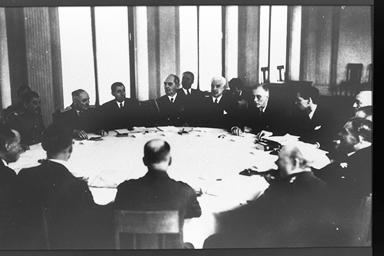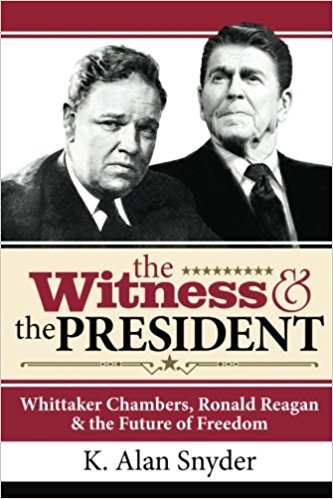Seventy-one years ago yesterday, one of the most intense political confrontations in American history occurred in the US House of Representatives. August 25, 1948, was the day that the man on the right in this photo, Alger Hiss, was asked publicly whether he had ever known the man standing on the left side of the photo. His name was Whittaker Chambers.

What was the controversy all about and why did it captivate the public for the next two years? Chambers, a confessed ex-communist, had named Hiss as one of his co-conspirators in the Underground movement that sought to place communists in key positions in the American government. The Underground also passed on information to the Soviet Union, information received from its agents within the government.
Alger Hiss was a key agent, having served as a high State Department official during WWII, and accompanying Franklin Roosevelt to the Yalta Conference in 1945. In the photo below, he is to FDR’s immediate right.

Hiss naturally denied Chambers’s allegations, and Americans who followed this drama through newspapers, weekly news magazines, and newsreels at the theaters, asked themselves “Who’s the liar?”
It was at the hearing on that August day that Hiss’s denials began to break down as the evidence mounted that he not only knew Chambers previously but was much closer to him personally than he was willing to admit.
At the end of that long day, Chambers finally got his opportunity to speak. When asked why he had brought these accusations and whether he had some kind of personal antipathy toward Hiss, he gave a response that should be recognized as one of the best moments in the history of the nation. Here’s how he related it in his classic autobiography, Witness:

As I struggled to control my feeling, slowly and deliberately, I heard myself saying, rather than said: “The story has spread that in testifying against Mr. Hiss I am working out some old grudge, or motives of revenge or hatred. I do not hate Mr. Hiss. We were close friends, but we are caught in a tragedy of history. Mr. Hiss represents the concealed enemy against which we are all fighting, and I am fighting. I have testified against him with remorse and pity, but in a moment of history in which this Nation now stands, so help me God, I could not do otherwise.” In the completely silent room, I fought to control my voice.
The words by themselves are powerful, but even more powerful is to watch Chambers deliver those words. Search for this video online and what you will see is a man who has to choke out those words because of the deep emotion he feels as he testifies to the truth, knowing full well it could send his friend to prison. Further, at this time, Chambers had no way of knowing if the confession of his former activities might be his ticket to prison as well. He stood for truth regardless of the cost.
Trials followed and Hiss was eventually found guilty of perjury and did go to prison. As the photo shows, Chambers was vindicated. But there was a cost: the loss of his senior editor position at Time magazine; nearly two years of sitting in courthouses to give his testimony; the stigma that followed him in many circles as an “informer.”

The only thing that saved Chambers financially was the writing of his autobiography, a bestseller that came out in 1952. If you haven’t read it, I heartily recommend you do, especially if you appreciate excellent writing. Chambers was a wordsmith with few equals. I give this book to my students when we study his “witness.”

One of the men who read Witness shortly after its publication was a Hollywood actor who had gone through the trials of communist subversion in his profession, as he sought to cooperate with legitimate investigations while protecting anyone who was falsely accused. When this man read Chambers, he finally understood for the first time why people were attracted to the false ideology of communism. It showed him what he had to do to combat it successfully. His name, of course, was Ronald Reagan, and he never forgot the debt of understanding he received from Chambers. As president, he awarded Chambers—posthumously—the Presidential Medal of Freedom for his contribution to American liberty.
The book you see here is one I wrote that shows the linkage between these two men. It tells the tale of two of the most influential Americans of the twentieth century. Yes, I do recommend it, not primarily because I wrote it, but because it illuminates for this generation just what was at stake for western civilization from the time of the Great Depression through the Cold War. May we never forget those who came before us to safeguard what we still possess today.
